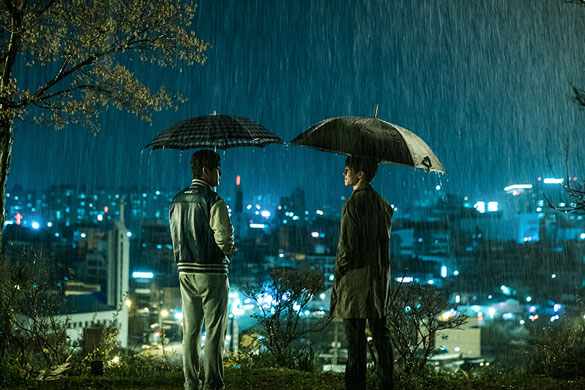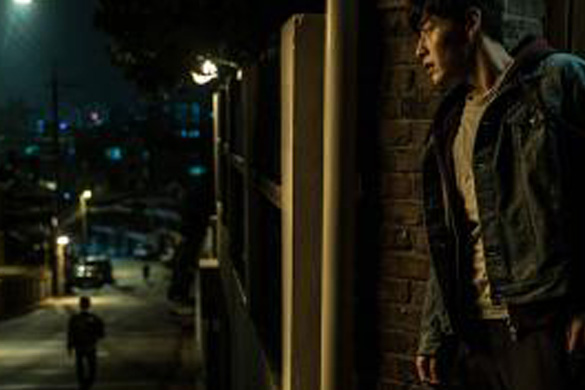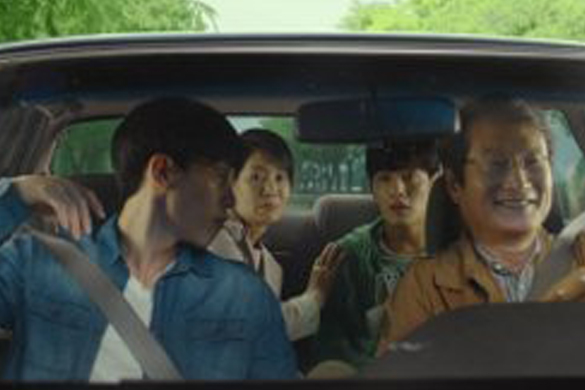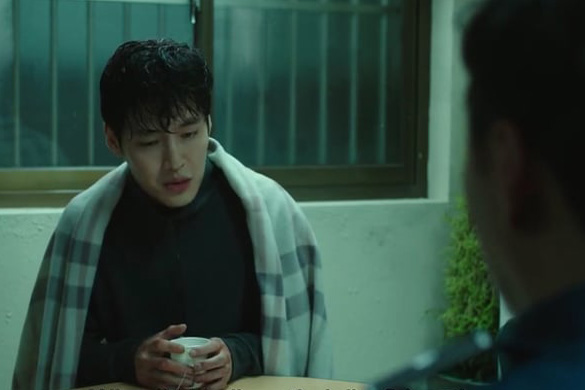"Did you take your medication yesterday?
Me leaving the house; the taxi you took to follow me; even the pencil you said I clicked in your face – none of those things happened.
You woke up at your desk where you fell asleep..."
Synopsis:
The year is 1997. 21-year-old Jin-seok (Kang Ha-neul) moves into a new home on the outskirts of the city with his mother (Na Young-hee), father (Moon Sung-keon) and older brother, Yoo-seok (Kim Moo-yeol). Almost before they have even fully unpacked, Jin-seok is told by his father that the room that was to have been his brother's still contains some of the previous owner's belongings and as such the two young men will have to share a room for the time being – his father also ruling the other room entirely off limits.
On daily medication to counter crippling anxiety, Jin-seok does his best to settle into life and study in his new surroundings but loud bangs and crashes he claims to hear coming from the off-limits room leave him with a growing uneasiness, to the point of panic. Not only that, but on taking a walk for some fresh air one night he sees his brother being abducted by a group of men, and when Yoo-seok eventually returns home 19 days later, behaving differently and with no apparent memory of where he's been, Jin-seok begins to suspect that this man is an imposter and isn't actually his brother at all.
Expressing his concerns to his parents, they too start acting oddly leading Jin-seok to the realisation that with no-one to confide in and no-one to turn to it's up to him alone to find out what really happened to his brother...
Review:
The early stages of Forgotten present what on the surface at least appears to be a happy, caring and close-knit family, narration by Jin-seok underlining his almost idolisation of his brother. I wouldn't say I'm that big a fan of narration for the most part but in this case it works well enough, providing a fairly easy laying out of the family structure and Jin-seok’s place within it.
The film's first scene shows Jin-seok waking during the car journey to his new home but even prior to this audio of a disembodied voice (accompanied by a wholly black screen) saying “You really don't remember?” and “Kill him!” points to the question of how balanced (or not) this young man’s mental state is. Director Jang Hang-jun takes this idea yet further as the story begins to unfold with repeated references to the medication Jin-seok is supposed to take daily, for a time intriguingly pushing viewers to surmise what is real and what is a nightmarish figment of the young man's clearly addled brain. While this works well for the most part in the early to mid stages of the narrative its success overall is ultimately wholly dependent on a major story 'reveal' at around the halfway mark and that sadly is where problems begin, but more on that in a moment.
 |
Director Jang Hang-jun initially goes to great pains to focus on Jin-seok’s assumptions about and perceptions of what is causing the strange sounds emanating from the mysterious room to the extent that Forgotten early on comes across as fairly standard ghostly horror fare with archetypal horror tropes appearing without particular efforts made to hide their Korean cinema origins (fans of Kim Jee-woon's classic New Korean Cinema wave output will know exactly what I'm referencing here) but while this side of Forgotten doesn't feature anything horror fans haven't seen a million times before (I mean, we even have a blood-soaked, long-haired and pale-faced female ghost appearing suddenly for a brief jump scare moment) it is nonetheless effective, even succeeding in making me jump at one point even though seconds before I'd told myself exactly what was probably going to happen.
However, the narrative gradually shows itself to be far more psychological thriller than horror per se and as such the classic horror aspect is pretty much jettisoned for the large part to be replaced by character intrigue and subterfuge, though some may feel it is discarded somewhat abruptly. Though the room ‘issues’ do reappear at a later stage (being ultimately brought into the realm of reality), the feeling of a major shift in tone does tend to linger.
But by far the biggest problem with Forgotten is the major reveal/twist occurring at around the halfway mark and indeed the way in which it is explained. The best of film narratives pivoting on a singular piece of information revealed almost in hindsight (Kim Jee-woon's classic A Tale of Two Sisters again comes immediately to mind) allow directors to craft scenes from the outset that appear as one thing initially, changing wholly in the wake of 20-20 vision brought on by the knowledge of the twist – the reveal instantly bringing numerous moments to mind naturally with little or no explanation needed save perhaps for a brief visual montage to underline the differing perspective hindsight brings and adding a significant depth to proceedings. In such cases, the ultimate story direction is often even shown to have been leading to an entirely different (wholly original) outcome to where we thought we were heading, with much of what we have witnessed serving two purposes depending on our perspective prior or subsequent to full disclosure.
 |
Director Jang Hang-jun does try to give a few such pointers as subtext but his reveal is of a back-story so convoluted that few such dual purpose scenes are possible. Instead, he chooses to use hugely protracted and painfully lengthy exposition to try to explain how things we have seen are in reality not what we initially assumed, with one character talking another – and as such talking viewers – through an entire history (complete with, again lengthy, flashback sequences) that neither audiences nor the other character in question could have come close to figuring out; the overall narrative not nearly crafted deftly enough to allow dual meanings to speak for themselves as much as they could and should have.
Not only that, but a number of sub-twists in the post-reveal narrative are either highly contrived (a professional’s fairly unlikely part in proceedings historically) or wholly predictable (the truth behind Yoo-seok’s involvement, years in the past). While viewers could (almost) grudgingly accept one of these and move on, the other is actually detrimental to a final narrative theme statement:
In the final moments of Forgotten, Yoo-seok asks Jin-seok a question to which Jin-seok reponds based on what he thinks Yoo-seok wants to hear. However, Jin-seok is entirely mistaken in that assumption and his words lead to yet another tragedy which though thought provoking is hugely detracted from by the sheer predictability of the major sub-twist we've just witnessed (as previously mentioned), resulting in our eyes rolling through the entire ending and indeed this thematic idea, to a degree at least.
Ultimately, Forgotten easily could have and should have been so much better, if only more effort had been taken in terms of contrivance and if scenes had been more deftly imbued with a dual purpose to negate the need for so, so much clunky dialogue-driven and flashback exposition. Sadly, that thought is the one that stayed with me above all others as and indeed after the credits rolled.
Summary:
If you were to watch only the first half of Forgotten, you'd likely assume you were mid-way through an intriguing, even gripping, psychological thriller-cum-horror. However, hugely protracted dialogue-driven and lengthly flashback exposition; story contrivances; and character arc predictability ultimately detract from this early success, screaming of how easily the film could have and should have been so much better. That sadly is the prevailing thought remaining above all others.
FORGOTTEN (기억의밤) / 2017
Director: Jang Hang-jun
Starring: Kang Ha-neul, Kim Moo-yeol, Na Young-hee, Moon Sung-keun
|





